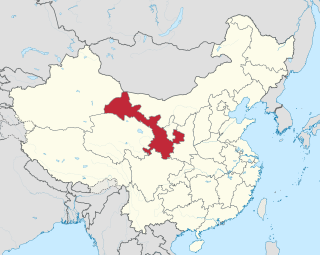This is a list of prisons within Gansu province of the People's Republic of China.

Gansu is a province of the People's Republic of China, located in the northwest of the country.
| Name | Enterprise name | City/County/District | Village/Town | Established | Notes |
|---|---|---|---|---|---|
| Baiyin Prison | Baiyin Farm | Jingyuan County, Gansu, Baiyin | Beiwan | 2002 | In Si'erping, largest prison in the Northwest |
| Dingxi Prison | Dingxi Crane Factory | Dingxi | Jiaojiapo | 1951 | Exports to Australia and Pakistan |
| Gan'gu Prison | Gan'gu Radiator Plant | Gangu County, Tianshui | Xinxing | ||
| Hezuo Prison | Gannan Tibetan Autonomous Prefecture | Hezuo | |||
| Jinchang Prison | Hongguang Horticultural Farm; Hongguang Horticultural Corp. | Jinchang | Tufosi | 1953 | Produces acid-proof antiseptic bricks and boards, chemical tower stuffing, low-voltage insulators, wear-resistant porcelain balls, porcelain sand among others. Also does agricultural production, raising livestock, seed harvesting, animal, husbandry, chemicals and ceramics, building materials, composite fodder, non-staple grain and oil food products, machining among others. Area of farm 14.17 km² |
| Jingyuan Prison | Jingyuan County, Gansu, Baiyin | Beiwan | In Guchengcun, merged with Baiyin Prison in 2002 | ||
| Jiuquan Prison | Jiuquan Farm; Jiuquan Electric Machinery Plant | Jiuquan | 1951 | Fixed assets over 25 mil yuan, sells to Hongkong and Macao | |
| Lanzhou Prison | Lanzhou Valve Plant (combination of former Lanzhou Valve Plant and Lanzhou Bus Factory); Lanzhou Valve LLC | Lanzhou | Large-scale prison, resulting from a 2000 merger, pre-merger Lanzhou Prison was founded in 1949. Fixed assets worth nearly 100 mil yuan. Produces, among other things, medium- and low-pressure valves of all types (exported to southeast Asian countries) | ||
| Pingliang Prison | Pingliang Machine Tool Accessories Factory (Pingliang Machine Tool Accessories LLC); Pingliang Sanitized Materials Plant | Pingliang | 2003 | Current Pingliang Prison is the result of Pingliang Prison established in 1951 | |
| Provincial Juvenile Offender Detachment | Liangzhou Carpet Plant | Wuwei, Gansu | moved to Wuwei in 1989 | ||
| Provincial No. 4 Prison | Pingliang Sanitary Materials Plant | Pingliang | Xidajie | 1949 | |
| Provincial Women's Prison | Jiuzhou Clothing Factory | Lanzhou | |||
| Tianshui Prison | Tianshui Machine Tool Plant (Tianshui Machine Tool LLC) | Tianshui | 1949 | Machine tool plant established in 1972 | |
| Tianzhu Prison | Tianzhu Construction Materials Plant | Tianzhu Tibetan Autonomous County | Shimen | in Mayingpo | |
| Tongcheng Prison | Wudaping Farm | Jingyuan County, Gansu, Baiyin | Zhongbao | 1969 | in Zhongbaoping, merged with Baiyin Prison in 2002 |
| Wudu Prison | Wudu District | Liangshui | 1949 | Originally called Provincial No. 11 Labor Reform Detachment, gross output value of all prison enterprises 3.4747 mil yuan in 2002. | |
| Wuwei Prison | Wuwei, Gansu | Possibly moved to Huangtaicun, Jinyang Town, Liangzhou District, possibly merged with Tianzhu and Yongdeng Prisons | |||
| Yongdeng Prison | Yongdeng Limestone Mine | Yongdeng County | Tungouwan Wushengyi | 1990 | Area of 600,000 m², possibly merged with Tianzhu and Wuwei Prisons |





